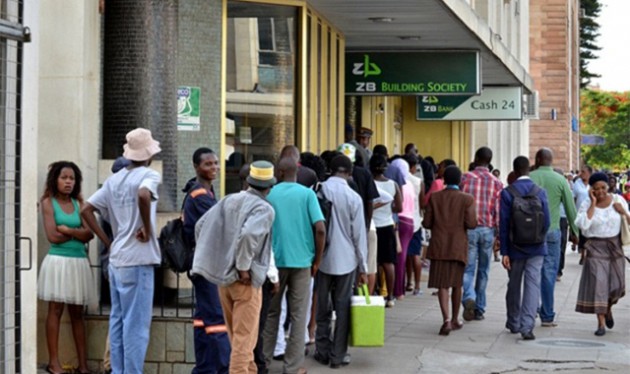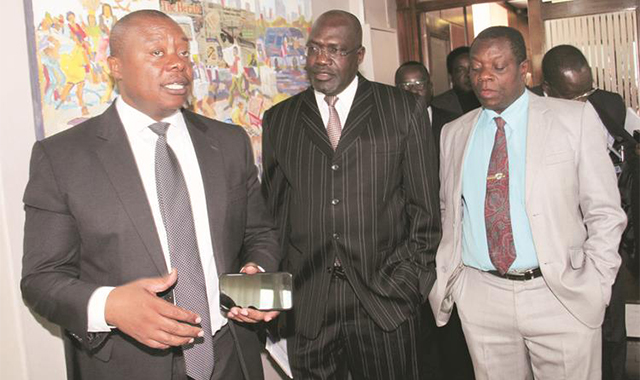Time to take cash crisis head on


The country’s productive sector is left poorer because the majority of workers are having to spend hours in bank queues trying to withdraw their salaries which they are given in drips and drabs
Lloyd Gumbo Mr Speaker Sir
Mr Speaker Sir, events of the past few weeks have dampened spirits, but make no mistake about it, this does not mean we are in recession already; it is a cash crisis that can be dealt with as long as the right mechanisms are put in place.
She tucked in her handbag, the stamped card with a number that she had been given, smiled with satisfaction that finally she would get her hard-earned cash from her bank having tried for days but in vain.
The fairly middle-aged woman was one of the first people to arrive at the bank around 3am hoping to withdraw a portion of her monthly salary when authorities feed money into the automated teller machine (ATM) at 8am.
When 8am arrived and the winding queue kept lengthening but with no space between those in the queue, some bank officials emerged and announced that only 100 depositors given numbers the previous day would be served, while the first 100 on the day without numbers would be given stamped cards with numbers so that they would try their luck the following day on condition the bank gets enough deposits.
It’s another day, another cash crisis in Harare, Gweru and Bulawayo where the story is the same; long winding queues at banks.
Mr Speaker Sir, there is a problem, a serious one that requires due attention that it appears to lack for now.
Authorities seem to be underestimating the cash crisis which is the reason there is a lot of trial and error with the hope of entrenching whatever seems to be working.
There seems to be no conviction among the authorities on the strategic way to deal with the problem, a development that has left the majority of people wondering where the country is heading.
The multi-currency system that started in February 2009 was to somehow stabilise things and almost everyone was positive that the country would continue on the positive trend.
Mr Speaker Sir, events of the past few weeks have dampened spirits, but make no mistake about it, this does not mean we are in recession already; it is a cash crisis that can be dealt with as long as the right mechanisms are put in place.
Yes, things could get worse for the next few months as deposits continue to shrink but there is still a way to deal with the problem.
But it should have been anticipated from the word go that there was a possibility of a cash crisis in the future given that we do not print the currency.
Obviously there was a possibility that America could withdraw its currency bit by bit as we head towards the next elections for obvious reasons.
There was a possibility of externalisation of the currency for fear of the unknown.
It is against that background that Government should have promoted use of all the currencies that are in the basket of currencies through enforcing their use instead of ending at policy level.
As things stand, the Chinese Yuan is an accepted currency in Zimbabwe but where is it?
Where is the South African rand?
Mr Speaker Sir, it’s not too late to right the wrong given the current challenges.
It is important that instead of banking on the bond notes that are not expected in the market until October, Government should seriously engage South Africa to get rands.
Yes, there has been reluctance to embrace the rand in Zimbabwe in the last few months as that currency kept hitting new lows against the US dollar.
But this is the time to flood the market with that currency if the anticipated recession is to be halted.
Bringing in the rand now will be ideal, considering that the US dollar is in scarcity, as such this won’t cause inflation.
There is also a high possibility that the official rate of the rand and against the US dollar will be accepted, a development that will also shield financial institutions.
Besides, the majority of goods that are bought in Zimbabwe are from South Africa so why not just make available that currency?
Failure to address this problem will brew serious trouble for the country.
As things stand, the country’s productive sector is left poorer because the majority of workers are having to spend hours in bank queues trying to withdraw their salaries which they are given in drips and drabs.
At the end of the day, production is affected as workers have to spend days at the bank instead of being productive.
This is the greatest challenge that has to be dealt with as a matter of urgency.
Any further delays will be a recipe for disaster.
Mr Speaker Sir, there is definitely nothing wrong with Government policy on promoting plastic money usage.
But that should be voluntary on the part of depositors.
There are some things where plastic money cannot be used on such as paying rentals.
Landlords do not have nor are they expected to have point of sale machines; all they want are their rentals in cash.
So authorities must make sure cash is available and also put incentives in place for those who use cards in their transactions.
Plastic money cannot be imposed on the people. Depositors should be left to decide what they want to do with their money.
Authorities are there to facilitate transactions in every form.
Mr Speaker Sir, perception is very important, as such authorities must deal with negativity about the economy that is currently unfolding.
Feedback: [email protected]









Comments